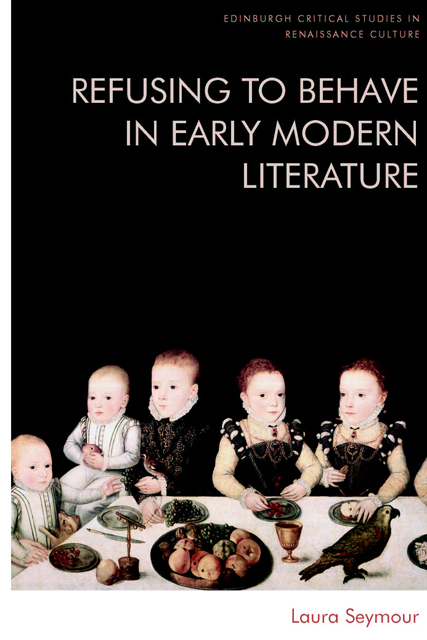Book contents
- Frontmatter
- Contents
- Acknowledgements
- Series Editor’s Preface
- Introduction: The Body at Play in Early Modern Texts
- 1 Ungracious Grace: Proprioception and Staging Taste in Thomas Dekker’s If This Be Not a Good Play, the Devil Is in It (1611)
- 2 Walking Without God – (Mis)Learning Through the Gait in Mateo Alemán’s Guzmán de Alfarache (1599 and 1604) and James Mabbe’s The Rogue (1622)
- 3 Plain Plasticity – Thomas Ellwood’s The History of the Life of Thomas Ellwood (1714)
- 4 Chaste and Silent – Again. Vitality and the Bound and Loosed Body in I.T.’s Grim the Collier of Croydon; or, The Devil and His Dame (c. 1600)
- Index
2 - Walking Without God – (Mis)Learning Through the Gait in Mateo Alemán’s Guzmán de Alfarache (1599 and 1604) and James Mabbe’s The Rogue (1622)
Published online by Cambridge University Press: 25 April 2023
- Frontmatter
- Contents
- Acknowledgements
- Series Editor’s Preface
- Introduction: The Body at Play in Early Modern Texts
- 1 Ungracious Grace: Proprioception and Staging Taste in Thomas Dekker’s If This Be Not a Good Play, the Devil Is in It (1611)
- 2 Walking Without God – (Mis)Learning Through the Gait in Mateo Alemán’s Guzmán de Alfarache (1599 and 1604) and James Mabbe’s The Rogue (1622)
- 3 Plain Plasticity – Thomas Ellwood’s The History of the Life of Thomas Ellwood (1714)
- 4 Chaste and Silent – Again. Vitality and the Bound and Loosed Body in I.T.’s Grim the Collier of Croydon; or, The Devil and His Dame (c. 1600)
- Index
Summary
In sixteenth-century Spain, a young man uses a church as his catwalk. Finely dressed but with his teeth loose from beatings sustained when he first set out into the violent and mendacious world, this young man, Guzmán, is especially proud of his stockings, garters, and Tudescan (-style) shoe fastenings. As he walks, therefore, Guzmán calls his readers’, and other characters’, attention to his legs: stretching, poising, and stiffening them. He struts like a chicken round and round the church, paying a visit to all its side-chapels; his purpose is not to pray but to gain maximum exposure for his flashily-clothed body. Guzmán’s contrived gait garners plenty of attention from other worshippers, though not the adulatory kind he seeks and envisages. Guzmán recounts,
I woke early on the Sunday. I got myself up looking fine, and hit the Great Church with vim and vigour. I went to hear Mass, though I suspect that I was more keen to be seen; I traversed the whole place three or four times and visited the chapels where more people were gathered until I came to idle among the choirs where there were many ladies and gallants. But I saw myself as the king of the cockerels, the one who’d won the prize, and like the lusty shepherd I showed off all my outfit, wanting them to see me and to remark on everything right up to the Tudescan fastenings. I stretched out my neck and began to inflate my belly and stiffen my legs: I was so vain about my looks and wiggling movements that everyone had to note me, laughing at my infamy. But however much they looked at me I didn’t look into the matter nor did I examine my faults which were the cause of their laughs. Before now it seemed to me that they were admiring my curiosity and gallantry.
Ameneció el domingo. Púseme de ostentación, y di de golpe con mi lozanía en la Iglesia Mayor, para oír misa, aunque sospecho que más me llevó la gana de ser mirado; paséela toda tres o cuatro veces, visité las capillas donde acudía más gente, hasta que vine a parar entre los dos coros, donde estaban muchas damas y galanes.
- Type
- Chapter
- Information
- Refusing to Behave in Early Modern Literature , pp. 36 - 57Publisher: Edinburgh University PressPrint publication year: 2022



